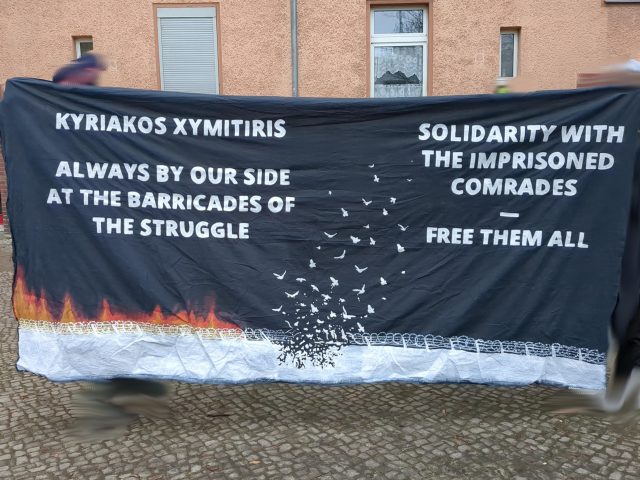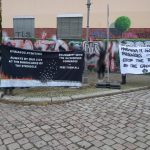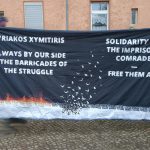Zu den Internationalen Aktionstagen 30.12. – 01.01. : In Gedenken an Kyriakos X und in Solidarität mit den Verfolgten des Ampelokipoi-Verfahrens

In Zusammenhang mit dem Internationalen Aufruf für Aktionstage 30.12. – 01.01.: In Gedenken an Kyriakos X und in Solidarität mit den Verfolgten des Ampelokipoi-Verfahrens fand am Nachmittag des 30.12. eine kleine unangemeldete Kundgebung vor dem sogenannten Frauengefängnis des Offenen Vollzugs in der Neuwedeller Straße 4 in Berlin-Neukölln statt.
Es wurden Flyer auf der Straße verteilt, mit lauten Rufen die Solidarität mit allen Gefangenen ausgedrückt und ein Redebeitrag gehalten. In Erinnerung an Kyriakos X. hallte sein Name laut durch die Straßen Neuköllns.
Die Kundgebung wurde, ohne von Bullen belästigt oder kontrolliert zu werden, selbstbestimmt wieder aufgelöst.
Es heißt, dass in den Stunden danach noch viele der Poster in Andenken an Kyriakos X und in Solidarität mit den Verfolgten im Ambelokipoi-Verfahren in den Straßen Neuköllns plakatiert wurden.
Am Abend des 31.12. fand vor der JVA Moabit die Silvester zum Knast – Demonstration statt. Mit Bannern und einem Redebeitrag wurde auch hier an Kyriakos erinnert und bestärkt, dass niemand alleine in den Händen der Macht gelassen wird. Weder in den Knästen Berlins, noch in Korydallos in Athen – nirgendswo.
Von Minute 37:05 gibt es den Redebeitrag bei Radio Aktiv Berlin, die einen Bericht von der Demonstration veröffentlicht haben: https://archive.org/details/2025-01-02-16h-radio-aktiv-sz-k.
[eng]In connection with the International Call for Days of Action 30.12. – 01.01.: In memory of Kyriakos X and in solidarity with the persecuted in the Ampelokipoi case, a small unannounced rally took place on the afternoon of 30.12. in front of the so-called women’s prison of the open prison in Neuwedeller Straße 4 in Berlin-Neukölln.
Flyers were distributed on the street, solidarity with all prisoners was expressed with loud shouts and a speech was given. In memory of Kyriakos X, his name echoed loudly through the streets of Neukölln.
The rally was dispersed without being harassed or controlled by the cops.
It is said that in the hours that followed, many posters were put up on the streets of Neukölln in memory of Kyriakos X and in solidarity with those persecuted in the Ambelokipoi trial.
On the evening of December 31, the New Year’s Eve to Prison demonstration took place in front of Moabit Prison. With banners and a speech, Kyriakos was remembered and it was clearly said that no one is left alone in the hands of power. Neither in the prisons of Berlin, nor in Korydallos in Athens – nowhere.
From 37:05min. you can listen to the speech at the radio show of Radio Aktiv Berlin, who they made a report from the demonstration: https://archive.org/details/2025-01-02-16h-radio-aktiv-sz-k.
**
Der Redebeitrag, der in Neukölln gehalten wurde [ENG + GR below]
[GER]
Vor fast zwei Monaten, am 31. Oktober, verloren wir unseren geliebten anarchistischen Gefährten Kyriakos Xymitiris, als er bei einer Explosion in einer Wohnung in Ampelokipoi, in Athen, getötet wurde. Bei der Explosion wurde unsere anarchistische Gefährtin Marianna M. schwer verletzt.
Nach dem Vorfall wurden Marianna M., Dimitra Z., Dimitris P., A.K. und Nikos Romanos inhaftiert, gegen sie wird nun ein Ermittlungsverfahren wegen einer sogenannten „terroristischen Vereinigung“ geführt.
An diesem 31. Dezember nehmen sich Gefährt*innen auf der ganzen Welt Zeit, um derer zu gedenken, die im Kampf für die Befreiung gefallen sind, in der Vergangenheit inhaftiert wurden oder heute noch hinter Gittern sitzen. Als Versammlung zum Gedenken an Kyriakos und in Solidarität mit den verfolgten Gefährt*innen im Ampelokipoi-Fall wollen wir heute im Rahmen der Aktionstage unsere herzlichsten Grüße an die Inhaftierten hier in Neukölln senden.
Aus der generellen Ablehnung des Gefängnissystems heraus ziehen wir keine Grenze zwischen denjenigen, die aus sogenannten „politischen Motiven“ wegen ihrer angeblichen Straftaten inhaftiert sind und den „sozialen“ Gefangenen, die eingesperrt sind, weil sie nicht den gesellschaftlichen Normen entsprechen. Ganz im Gegenteil, wir betrachten die inhaftierten Menschen als Gefangene des sozialen Krieges, den die Staaten überall auf der Welt gegen diejenigen führen, die sie für unerwünscht, unwürdig und daher gefährlich und „kriminell“ halten.
Bestrafung wird von den Machthabern als Mittel der Herrschaft eingesetzt, um all jene zu unterdrücken, die Widerstand leisten und sich dem herrschenden System nicht anpassen oder gar widersetzen. Gefängnisse sind ein Instrument des Staates, um zu unterdrücken und einzuschüchtern und um kollektive Momente der Rebellion durch Isolation zu ersticken.
Es ist keine Schande, als „kriminell“ abgestempelt zu werden, denn es sind die Staaten und ihre Institutionen, die Menschen auf der ganzen Welt ihrer Freiheit berauben, um den Kapitalismus und alles, was für sein Funktionieren notwendig ist, zu verteidigen: Rassismus, Patriarchat, Klassismus, um nur einige zu nennen.
Sogenannte Frauengefängnisse und offene Vollzüge spiegeln besondere Formen der Unterdrückung wider. In den meisten Fällen liegen die Gründe für die Inhaftierung in patriarchalen Strukturen außerhalb, die auch im Gefängnis reproduziert werden. Für FLINTA*, vor allem aus prekären Verhältnissen, bedeutet die Strafe der Isolation und damit die Trennung der Gefangenen von Freund*innen, Gefährt*inne und Familie einen viel größeren Druck auf die Betroffenen. Diejenigen, die bereits unter den Bedingungen leiden und die Verantwortung tragen, sich um die im Gefängnis Zurückgebliebenen zu kümmern, werden zusätzlich in Arbeit und Gesellschaft ausgebeutet.
Gerade der offene Vollzug täuscht Freiheit vor, was aber nur dazu dient, die Gefangenen zu disziplinieren, damit sie durch Lohnarbeit die Luft jenseits der Mauern einatmen können, sich aber jeden Tag wieder ausliefern müssen und dann gezwungen sind, im Gefängnis zu leben.
Das provoziert Zwang und suggeriert eine Freiheit, die die Widerwärtigkeit dieses Systems perfekt widerspiegelt. Die Gefangenschaft und die Bedrohung und Manipulation, die durch die Arbeit im Freien entsteht, da dies die wenigen Gelegenheiten sind, nahe und geliebte Menschen zu sehen, wird als ein Zugeständnis des Staates an diejenigen dargestellt, die nur der Staat in eben diese Lage bringen kann.
Um auf unseren gefallenen Gefährten Kyriakos Xymitiris zurückzukommen: Für diejenigen unter euch, die die Chance hatten, ihn zu treffen, und für diejenigen, die erst jetzt von ihm erfahren. Gemeinsam trauernd, gemeinsam wütend und gemeinsam diskutierend, haben wir mit Stolz die Verantwortung übernommen, die Ideen der Befreiung von Unterdrückung und der Freiheit für alle voranzutreiben, für die sich auch unser Gefährte eingesetzt hat. In der kollektiven Trauer haben wir Wege gefunden, die Distanz zu überwinden, die Isolation zu durchbrechen und Wege zu finden, unsere Trauer in Wut und Aktion zu verwandeln – heute und für immer.
Kyriakos Tod und die Ermittlungen gegen unsere Gefährt*innen werden uns nicht verstummen lassen. Stattdessen werden sie uns in unserer Entschlossenheit bestärken, dass wir vor allem dann, wenn viel auf dem Spiel steht, die Möglichkeit haben, uns zu positionieren, unsere Zähne zu schärfen und uns für die Konfrontation mit der Macht zu entscheiden.
Der griechische Staat versucht mit allen Mitteln, ein Szenario der Gefährlichkeit zu schaffen und sowohl unsere anarchistischen Gefährt*innen als auch Menschen, die in sein Schema passen, zu verfolgen, um ein Bild vom Erfolg des repressiven Staates zu zeichnen. Diese Willkür ist typisch für solche Verfahren, und wir müssen ihr mit Solidarität und in Komplizenschaft mit den Angeklagten und Verfolgten entgegentreten.
Wir widmen diese wenigen Worte dem Gedenken an Kyriakos Xymitiris und unseren Gefährt*innen, die sich jetzt in den Händen des griechischen Staates befinden, sowie allen, die aus den Zellen von Neukölln zuhören.
An euch und die Gefangenen anderswo: Niemand ist vergessen! Niemand allein in den Händen der Macht! Freiheit für alle! Das Recht gehört denen, die sich auflehnen!
In Liebe, Wut und Solidarität
——————–
Almost two month ago, on the 31st of october, we lost our beloved anarchist comrade Kyriakos Xymitiris, when he was killed in an explosion in an apartment in Ampelokipoi, Athens. In the explosion our anarchist comrade Marianna M. got seriously injured.
In the aftermath of the incident that took place, Marianna M., Dimitra Z., Dimitris P., A.K. and Nikos Romanos got imprisoned in what is now an open investigation for a so-called „terrorist organization“.
On this 31st of December comrades around the world take time to remember those who fell in the struggle for liberation, were imprisoned in the past or are still held behind bars today. As the assembly in memory of Kyriakos and in solidarity with the persecuted comrades in the Ampelokipoi-case, we want to send our warmest greetings in solidarity to those imprisoned here in Neukölln today as part of action days in memory of Kyriakos and in Solidarity with the persecuted in the case.
Out of the general rejection of the prison system we do not draw a line between those imprisoned for so-called „political motives“ in their alleged crimes on the one hand or the „social“ prisoners taken because of not fitting societies norms on the other hand. Quite the opposite, we consider the people in custody, prisoners of the social war, that states all over the world wage against those they deem unwanted, unworthy and therefore dangerous and „criminal“.
Punishment is used by those in power as a means of dominance to suppress all those who show resistance and do not adapt or even oppose the ruling system. Prisons are a tool of the state to oppress and intimidate and to stifle collective moments of rebellion through isolation.
There is no shame in being branded „criminal“ as it is the states and their institutions depriving people around the globe of their freedom, in order to defend capitalism and everything that is needed to make it function: Racism, Patriarchy, Classism, just to name a few.
So-called women’s prisons and open prisons reflect particular forms of oppression. In most cases, the reasons for imprisonment lie in patriarchal structures outside, which are also reproduced in prison. For FLINTA*, especially those from precarious backgrounds, the punishment of isolation and thus the separation of prisoners from friends, companions and family exerts much greater pressure on those affected. Those who already suffer from the conditions and bear the responsibility of caring for those left behind inside the prison, in addition to being exploited in work and society.
The open prison in particular fakes freedom, but this only serves to discipline the prisoners so that they can breathe in the air beyond the walls through wage labor, but have to hand themselves over again every day and are then forced to live in the prison.
This provokes bondage and suggests a freedom that reflects the repulsiveness of this system to perfection. The imprisonment and the threat and manipulation created by working outside, as these are the few opportunities to see near and dear ones, is presented as a concession by the state to those who only the state can put in this position.
Coming back to our fallen comrade Kyriakos Xymitiris: For those of you who had the chance of meeting him, and those that only now get to know about him. Grieving together, being angry together and discussing together, we have proudly taken the responsibility to advance the ideas of liberation from oppression and for freedom for all, that also our comrade was committed to. In the collective mourning we have found ways to overcome the distances, to break the isolation and to find ways to transform our grief into anger and action – today and forever.
Kyriakos death and the investigations against our comrades will not mute us. Instead they will further strengthen our determination that it is mostly when the stakes are high, that we have the opportunity to position ourselves, sharpen our teeth and chose to engage in the confrontation with power.
The Greek state is trying to create a scenario of dangerousness by all means and to persecute both our anarchist comrades and people who fit their pattern in order to paint a picture of the success of the repressive state. This randomness is typical of such procedures and we must confront it with solidarity and in complicity with the accused and persecuted.
We dedicate this few words to the memory of Kyriakos Xymitiris and to our comrades, now in the hands of the Greek state and to everyone listening from the cells of Neukölln.
To you and the prisoners elsewhere: No one is forgotten! No one alone in the hands of power! Freedom for all! The right belongs to those who revolt!
In Love, Rage and Solidarity
—————-
Πριν από περίπου δύο μήνες, την 31η Οκτώβρη, χάσαμε τον αγαπημένο μας αναρχικό σύντροφο Κυριάκο Ξυμητήρη, όπου σκοτώθηκε μετά από έκρηξη σε διαμέρισμα στους Αμπελόκηπους στην Αθήνα. Από την έκρηξη τραυματίστηκε σοβαρά η αναρχική συντρόφισσά μας Μαριάννα Μ.
Μετά το συμβάν προφυλακίστηκαν οι Μαριάννα Μ., Δήμητρα Ζ., Δημήτρης Π., Α.Κ. και Νίκος Ρωμανός στο πλαίσιο ανοιχτής έρευνας για φερόμενη „τρομοκρατική οργάνωση“.
Αυτήν την 31η Δεκέμβρη συντρόφισσες/οι ανά τον κόσμο μνημονεύουν αυτούς που έπεσαν στον αγώνα για την ελευθερία, που φυλακίστηκαν στο παρελθόν ή κρατούνται πίσω από σιδερένιες μπάρες στο σήμερα. Ως συνέλευση μνήμης του Κυριάκου Ξ. και αλληλεγγύης στους/ις διωκόμενους συντρόφους/ισσες της υπόθεσης των Αμπελοκήπων, θέλουμε να στείλουμε θερμούς χαιρετισμούς αλληλεγγύης σε όσες είναι φυλακισμένες σήμερα 30/12 εδώ στο Neukölln, ως μέρος των ημερών δράσης στη μνήμη του Κυριάκου και σε αλληλεγγύη με τις/ους διωκόμενες/ους της υπόθεσης.
Απορρίπτοντας συνολικά το σύστημα των φυλακών, δεν διαχωρίζουμε αυτούς που φυλακίστηκαν με λεγόμενο „πολιτικό κίνητρο“ για τα φερόμενα εγκλήματά τους, από όσες/ους κρατούμενες/ους κατηγορήθηκαν για „κοινωνικά“ εγκλήματα επειδή δεν ταίριαξαν στις νόρμες της κοινωνίας. Αντιθέτως, θεωρούμε ότι τα άτομα υπό κράτηση είναι φυλακισμένα ενός κοινωνικού πολέμου, διωκόμενα από τα κράτη ανά τον κόσμο που τα θεωρούν ανεπιθύμητα, ανάξια και επομένως επικίνδυνα και „εγκληματίες“.
Η τιμωρία εφαρμόζεται από όσους είναι στην εξουσία ως μέσο κυριαρχίας για να καταπιέσει όλα τα άτομα που αντιστέκονται και δεν προσαρμόζονται ή και εναντιώνονται στο σύστημα εξουσίας. Οι φυλακές είναι εργαλείο του κράτους για να καταπιέζει, να εκφοβίζει και να καταπνίγει μέσω της απομόνωσης την οποιαδήποτε δράση αντίστασης.
Ο στιγματισμός ενός ατόμου ως „εγκληματία“ δεν αποτελεί ντροπή, καθώς τα κράτη και τα ιδρύματά τους είναι εκείνα που στερούν την ελευθερία των ανθρώπων ανά την υφήλιο, με σκοπό την υπεράσπιση του καπιταλισμού και όσων χρειάζεται για να λειτουργήσει: ρατσισμός, πατριαρχία, ταξικός διαχωρισμός είναι μόνο κάποια από αυτά.
Οι λεγόμενες γυναικείες φυλακές και οι ανοιχτές φυλακές αντανακλούν συγκεκριμένες μορφές καταπίεσης. Στις περισσότερες περιπτώσεις η αιτιολογία της φυλάκισης έγκειται σε πατριαρχικές δομές εκτός φυλακής, οι οποίες αναπαράγονται και εντός αυτής. Για τις γυναίκες και τα ΛΟΑΤΚΙ+ άτομα, ειδικά για αυτά με επισφαλές υπόβαθρο, η τιμωρία της απομόνωσης και κατά συνέπεια ο αποχωρισμός τους από φίλες/ους, συντρόφους/ισσες και οικογένεια ασκεί πολύ μεγαλύτερη πίεση στα άτομα που επηρεάζονται. Αυτά τα άτομα υποφέρουν τόσο μέσα στη φυλακή κουβαλώντας την ευθύνη της φροντίδας όσων έχουν μείνει πίσω, όσο και από την εκμετάλλευση στη δουλειά και την κοινωνία.
Συγκεκριμένα, η ανοιχτή φυλακή προσποιείται την ελευθερία, αλλά αυτό εξυπηρετεί μόνο την πειθαρχία των φυλακισμένων, έτσι ώστε να μπορούν να αναπνέουν τον αέρα εκτός των τοιχών της φυλακής μόνο μέσω της μισθωτής εργασίας, αλλά και να παραδίδουν τον εαυτό τους καθημερινά κι επαναλαμβανόμενα στην μισθωτή σκλαβιά και στην συνέχεια να εξαναγκάζονται να ζουν στην φυλακή.
Αυτό προκαλεί τη δουλεία και υποδηλώνει ένα είδος ελευθερίας που αντανακλά παντελώς την απωθητικότητα αυτού του συστήματος. Η φυλάκιση και η απειλή και χειραγώγηση που δημιουργείται από την εργασία έξω, καθώς αυτές είναι οι λίγες ευκαιρίες να δει κανείς τους κοντινούς και αγαπημένους του ανθρώπους, παρουσιάζεται ως παραχώρηση του κράτους σε αυτούς/ες που μόνο το κράτος μπορεί να φέρει σε αυτή τη θέση.
Επιστρέφοντας στον πεσόντα σύντροφό μας Κυριάκο Ξυμητήρη: για όσους/ες από εσάς είχατε την ευκαιρία να τον γνωρίσετε, αλλά και για όσους μόλις τώρα μαθαίνουν γι‘ αυτόν. Θρηνώντας μαζί, θυμώνοντας μαζί και συζητώντας μαζί, αναλάβαμε με περηφάνια την ευθύνη να προωθήσουμε τις ιδέες της απελευθέρωσης από την καταπίεση και της ελευθερίας για όλους/ες, στις οποίες και ο σύντροφός μας είχε δεσμευτεί. Στο συλλογικό πένθος βρήκαμε τρόπους να ξεπεράσουμε τις αποστάσεις, να σπάσουμε την απομόνωση και να βρούμε τρόπους να μετατρέψουμε τη θλίψη μας σε οργή και δράση – σήμερα και για πάντα.
Ο θάνατος του Κυριάκου και οι έρευνες εναντίον των συντρόφων μας δεν θα μας κάνουν να σωπάσουμε. Αντιθέτως, θα ενισχύσουν ακόμη περισσότερο την αποφασιστικότητά μας κυρίως όταν το διακύβευμα είναι τόσο μεγάλο. Έχουμε την ευκαιρία να τοποθετηθούμε, να ακονίσουμε τα δόντια μας και να επιλέξουμε να εμπλακούμε στη σύγκρουση με την εξουσία.
Το ελληνικό κράτος προσπαθεί με κάθε τρόπο να δημιουργήσει ένα σενάριο επικινδυνότητας και να διώξει τόσο τους αναρχικούς συντρόφους μας όσο και ανθρώπους που ταιριάζουν στο μοτίβο του, προκειμένου να διαμορφώσει μια εικόνα επιτυχίας του κατασταλτικού κράτους. Αυτή η τυχαιότητα των στοχοποιήσεων είναι χαρακτηριστική τέτοιων διαδικασιών και πρέπει να την αντιμετωπίσουμε με αλληλεγγύη και συμπόρευση με τις/ους κατηγορούμενες/ους και διωκόμενες/ους.
Αφιερώνουμε αυτά τα λίγα λόγια στη μνήμη του Κυριάκου Ξυμητήρη και στους/ις συντρόφους/ισσες μας, που τώρα βρίσκονται στα χέρια του ελληνικού κράτους και σε όλες όσες ακούνε από τα κελιά του Neukölln.
Σε εσάς και στις/ους φυλακισμένες/ους οπουδήποτε: Κανείς δεν ξεχνιέται. Καμιά δεν είναι μόνη της στα χέρια της εξουσίας. Λευτεριά για όλες. Το δίκιο το έχουν οι εξεγερμένες!
Με αγάπη, οργή και αλληλεγγύη






